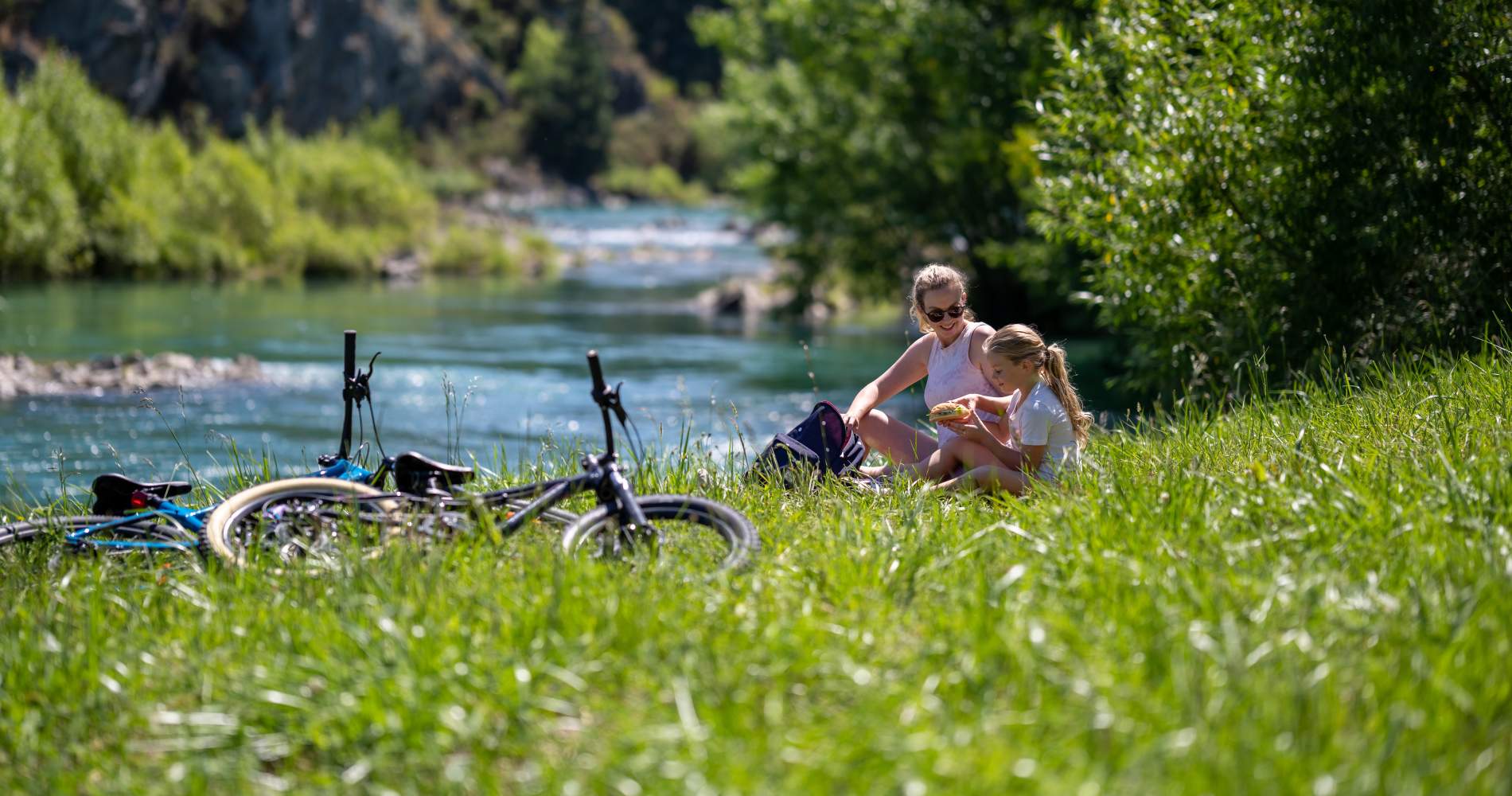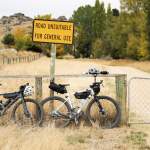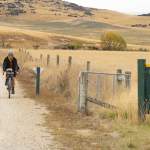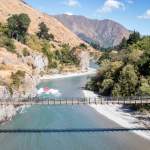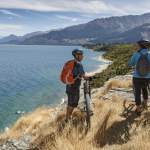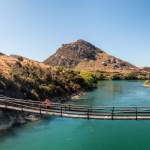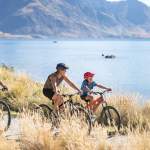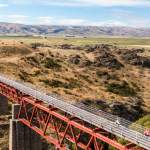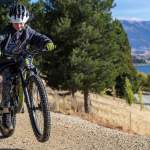
Travel Tips for an Affordable Cycling Holiday
Biking is the ideal way to explore the Otago region and, if well-planned, cycling holidays can be a cost-effective as well as a low-impact way to travel.
If you live on New Zealand’s South Island with your own transport and bikes, then a cycling trip to ride Otago’s trails can be an easy and affordable holiday to organise. But for those visiting from the North Island or overseas it’s not so convenient to travel with your own bikes. So here are some travel tips to help stretch your holiday budget a bit further.
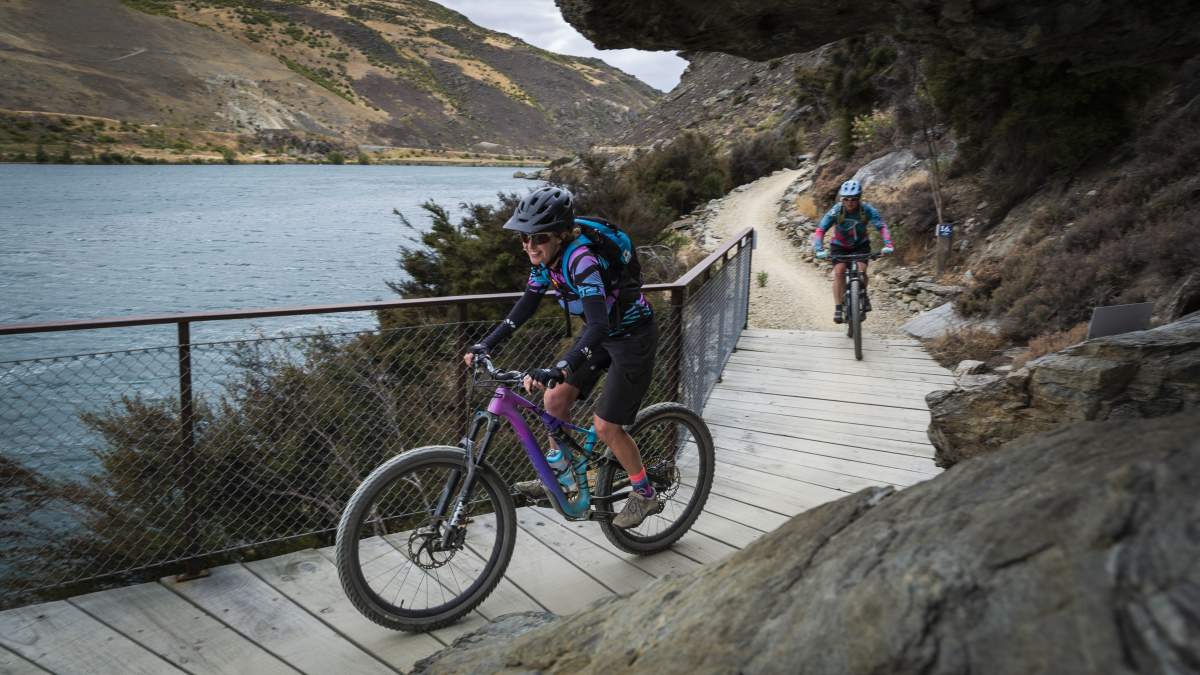
The construction of the Great Rides is often complex and expensive...
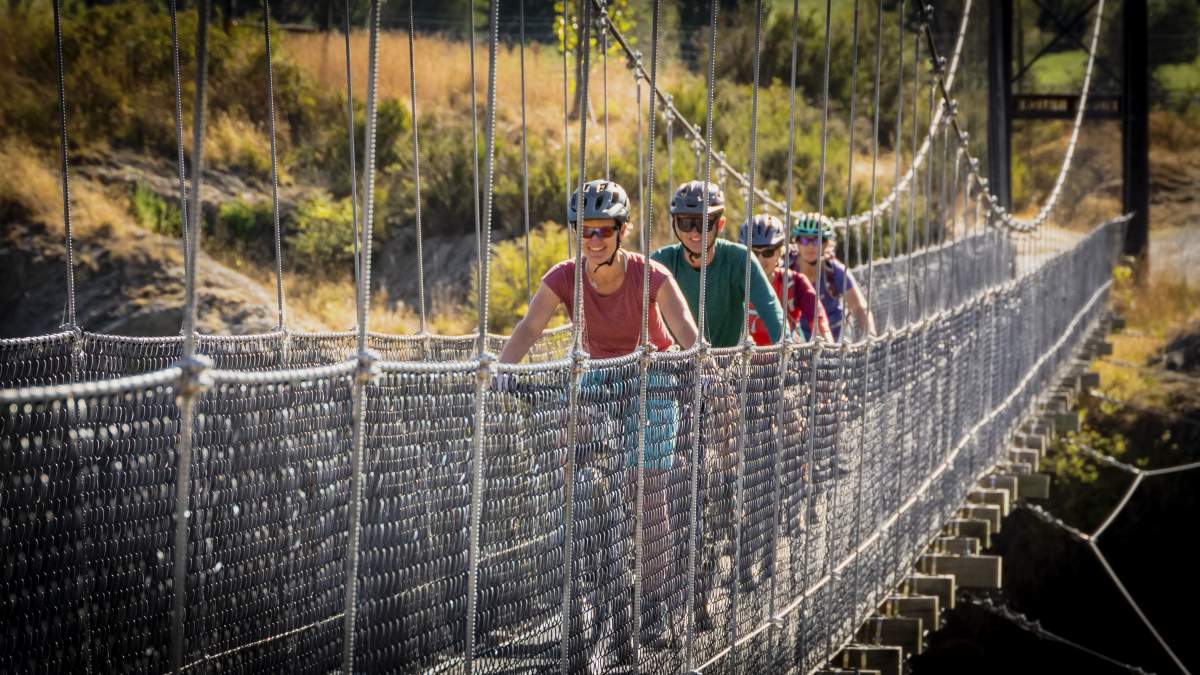
...but the trails are free for everyone to use. Photos: Lake Dunstan Trail (L) and Queenstown Trail (R).
The Great Rides are free to use!
Firstly, the Great Rides are free to use. Unlike many mountain bike parks, there’s no cost to access Otago’s 500km+ network of purpose-built walking and cycling trails.
*Whilst free to ride, the trails are managed and maintained by not-for-profit trusts and donations are always welcome to help improve the trail experience.
What’s your style?
When you start planning a bike trip, think about the level of comfort and support you’d like and what you can afford. Do you want a fully guided and supported trip? Are you happy to plan and book your own travel independently, perhaps even consider bikepacking? Or would something in between suit your budget and style better like a self-guided tour?
On self-guided tours, one of the most popular options for riding the trails, your tour operator will organise your bikes, accommodation reservations, and will transfer your luggage from A to B each day, while you ride a pre-planned route on your own. Alone but not necessarily unaided - most tour operators offer a helpline in case you encounter emergencies or problems along the trail.
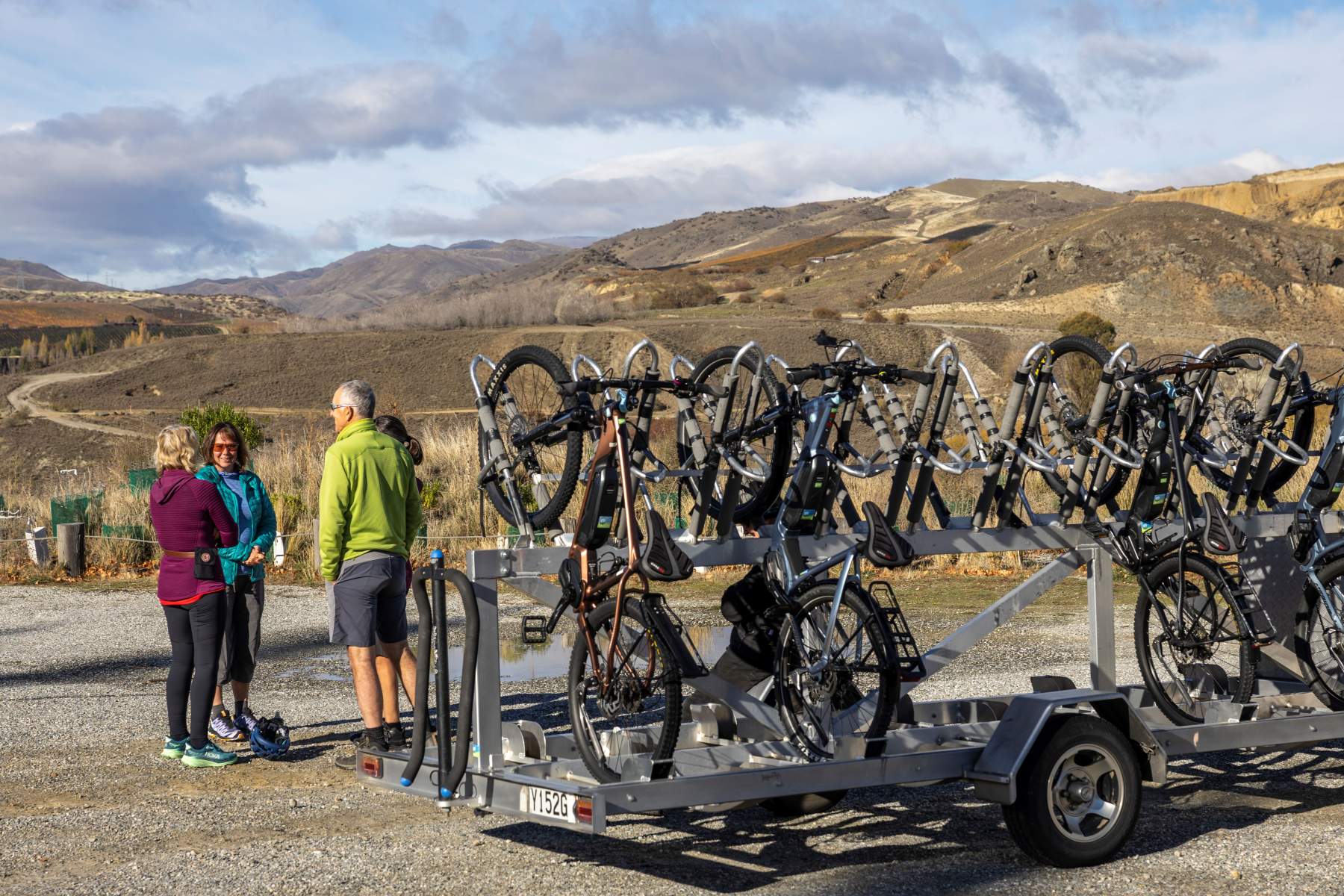
'Self-guided' multi-day tours take the hassle out of planning your holiday and include accommodation bookings, bike hire and daily baggage transfers.
Talk to the tour operators
Local bike tour operators are experts at designing tailored itineraries to suit every style of travel and budget. Let them know your price range. They can be very accommodating especially if you’re flexible with travel dates.
Often, it's no more expensive to book with a bike tour company than reserving accommodation directly. So why not take the hassle out of your holiday and use the expert services of a professional tour planner?
Accommodation
Accommodation can be one of the major expenses on any holiday so if you can forego some luxuries, then that’ll help you stick to a budget. Think about staying at campgrounds, cabins at holiday parks or motels – there are plenty of options along Otago’s cycle trails. Do you need your own ensuite bathroom? If not, then sharing facilities is a good cost saving option.
Accommodation throughout Central Otago is often in the form of Bed and Breakfast, meaning that if you book a B&B, breakfast is included and so it’s one less meal you need to buy.
Group travel
If you’re travelling as a family or group of friends, then there can be savings from sharing accommodation, shared baggage transfers and splitting other expenses like meals or taxis and transfers. You can also share the load when it comes to bike tools and spares.

You don't have to stay in luxurious castles.... although that is an option! (Photo: Larnarch Castle, Dunedin, James Hustler)
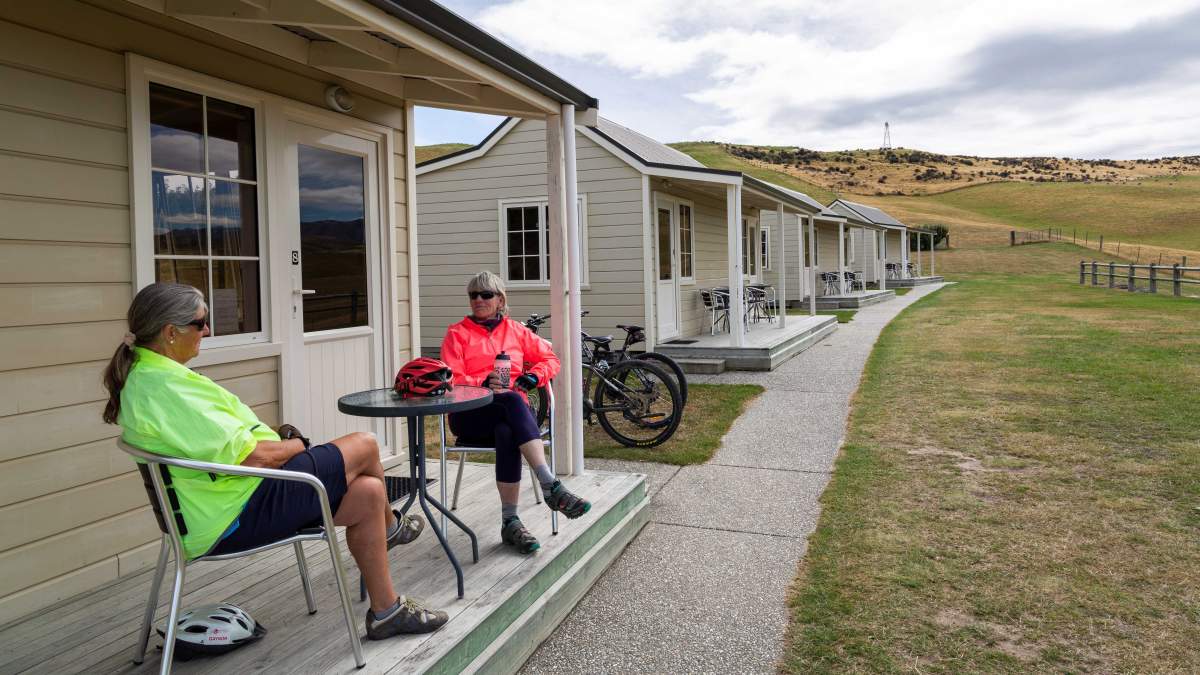
Purpose-built cabins at Wedderburn on the Otago Central Rail Trail.
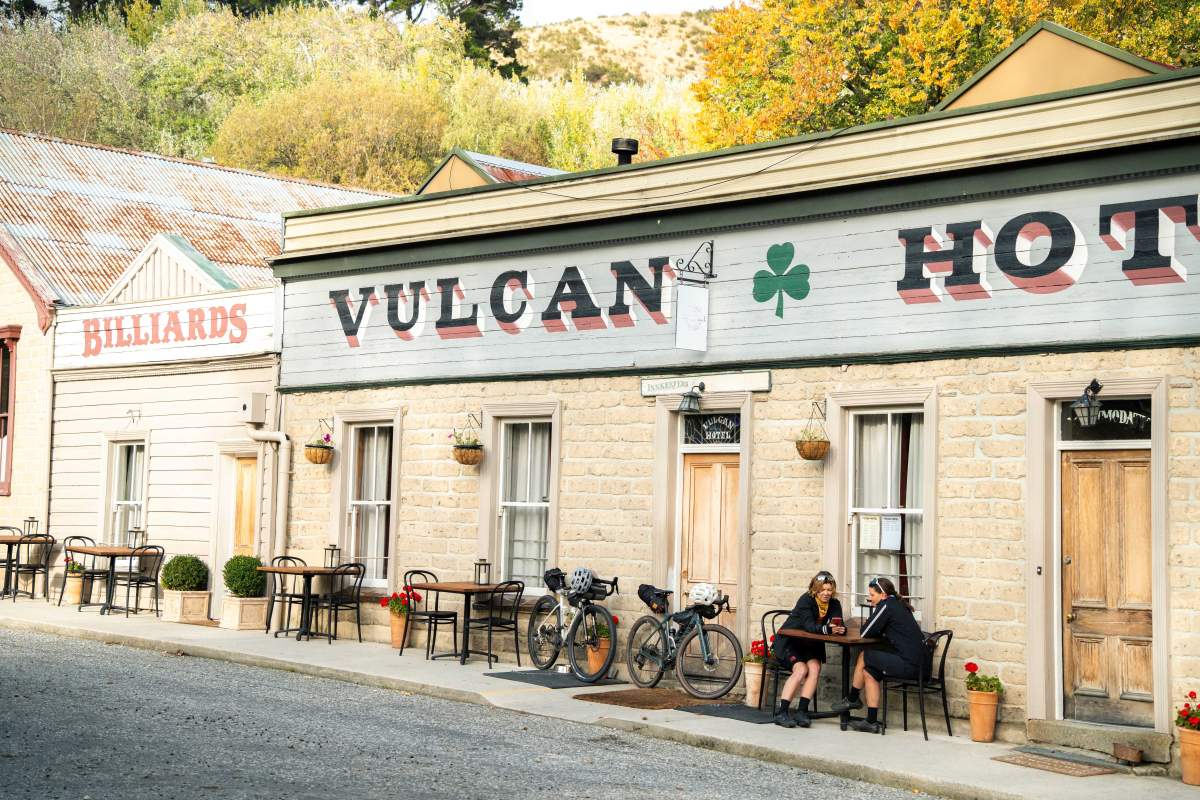
Country pubs offer affordable accommodation (Vulcan Hotel, St Bathans: Riley Mclay)
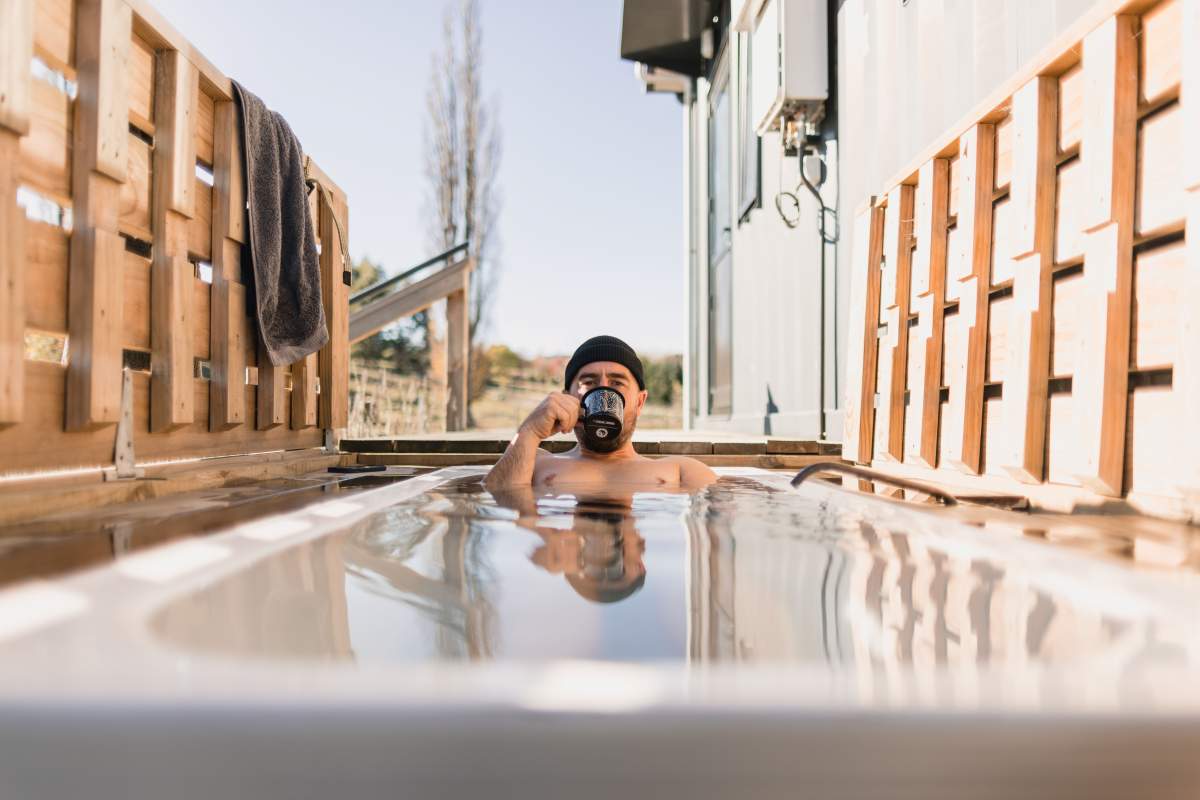
Travelling on a budget doesn't mean you have to forego all luxuries! (Ormaglade Cabins, Clutha Gold Trail).
Muscle Powered or Battery Powered?
E-bikes have revolutionised the bike industry, making cycling holidays more accessible to a much wider audience. Generally, hiring an e-bike will be more expensive than a standard ‘analogue’ bike, but with the battery power of an e-bike you’ll be able to ride further each day which has some advantages. For example, on a conventional ‘human-powered’ bicycle most people will take 4-5 days to complete the 152km long Otago Central Rail Trail. However, with an e-bike the trail becomes achievable in 3-days i.e. a shorter trip saving on 1 or 2 days of expense.
Most cycle tour operators will have a fleet of different bikes available, ranging from the latest premium models to bikes which might be a couple of seasons old. Talk to your tour operator about whether there are cost saving options for renting different styles of bikes.
If you do opt for an e-bike, you’ll find that complimentary battery charging is offered at most accommodation.
Read more: Tips for safe and enjoyable e-bike riding.
Hubs, Spokes and Loops
Staying in one central hub and finding good loop rides or out and back rides on ‘spokes’ saves on transport costs, i.e. fuel for your vehicle or transfer shuttles needed for 1-way trips.
The Queenstown Trails offer a well-connected network of trails for loop rides, with over 130km of trails to explore from a central hub in either Queenstown itself or nearby Arrowtown. By basing yourself in Alexandra or Clyde you can choose from the Lake Dunstan Trail, Otago Central Rail Trail or Roxburgh Gorge Trail (from where you can connect to the Clutha Gold Trail).
For the more adventurous look at creating your own loop rides. There are some great gravel roads which connect to the Rail Trail and a weekend trip to Naseby, Ranfurly, or Omakau offers some fantastic trail and gravel riding. Or, if you’re feeling fit how about a complete loop of Otago over 6-10 days?
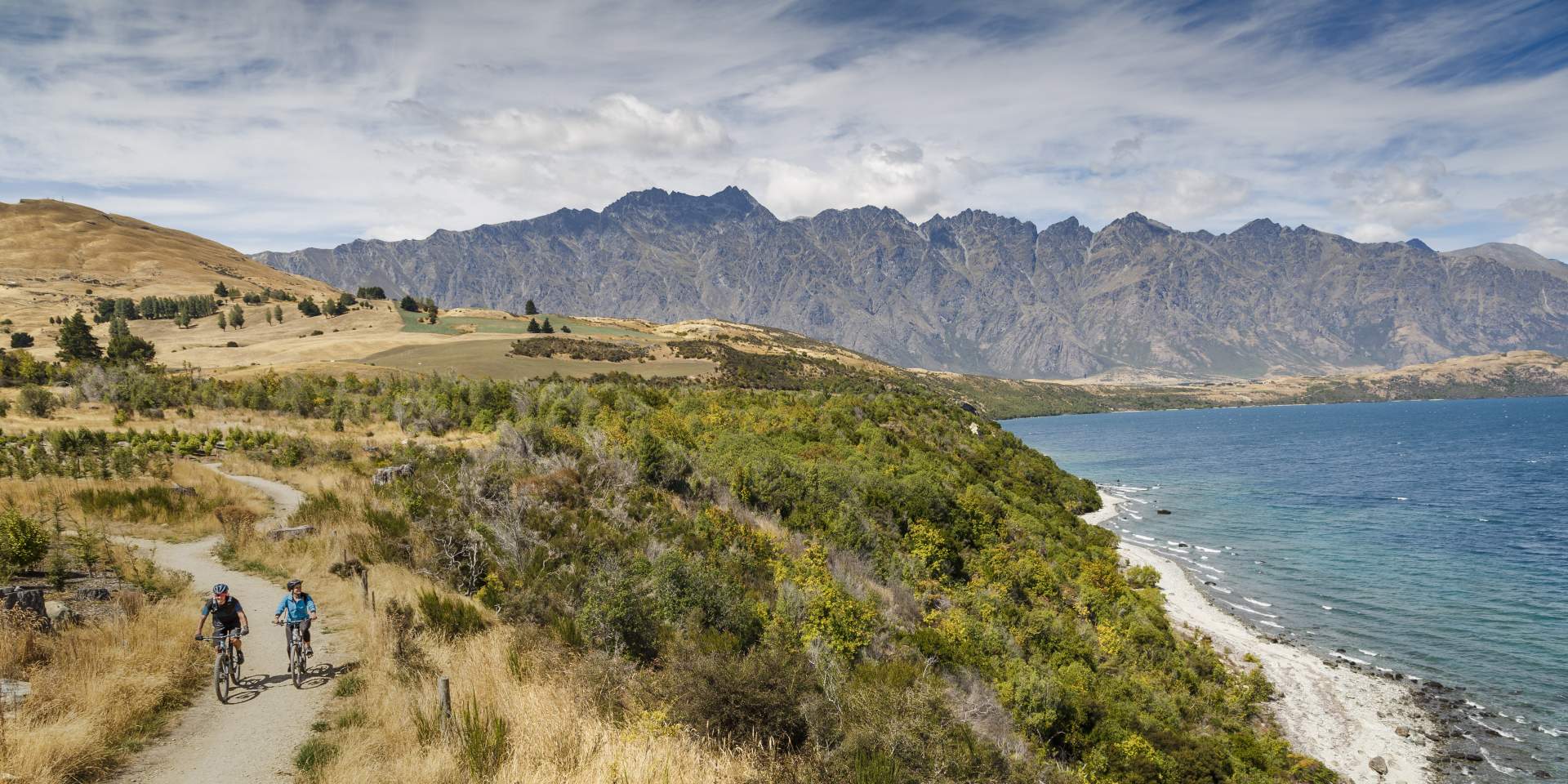
Queenstown's 130km trail network offers many different configurations for loop rides, with cafes, breweries and wineries to visit enroute.
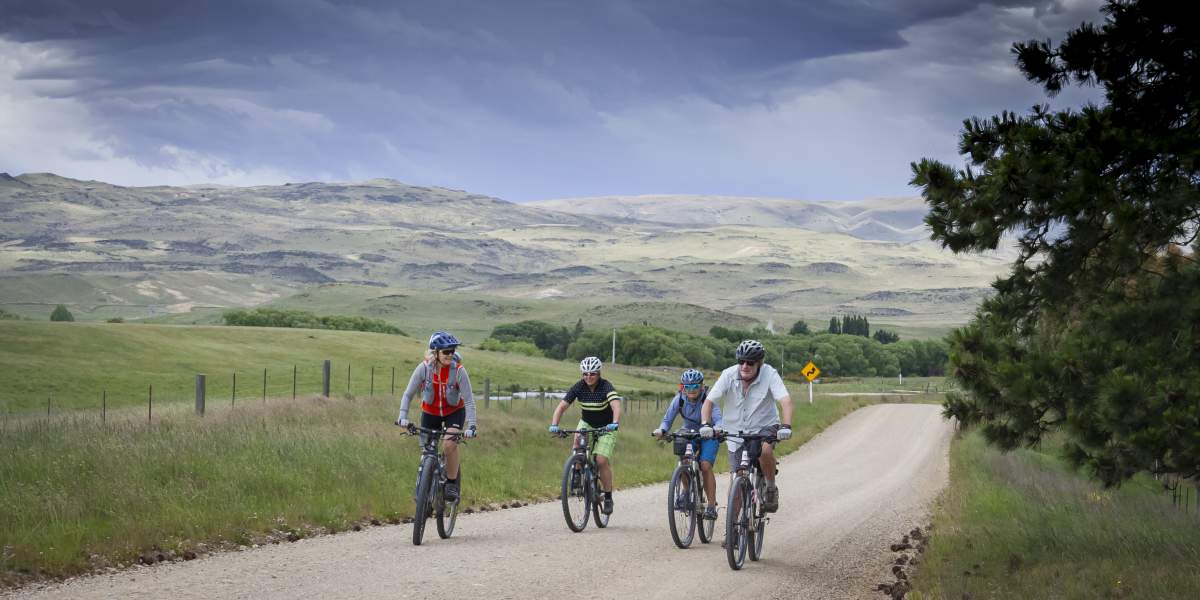
The backroads around Naseby and Ranfurly make great loops off the Rail Trail.
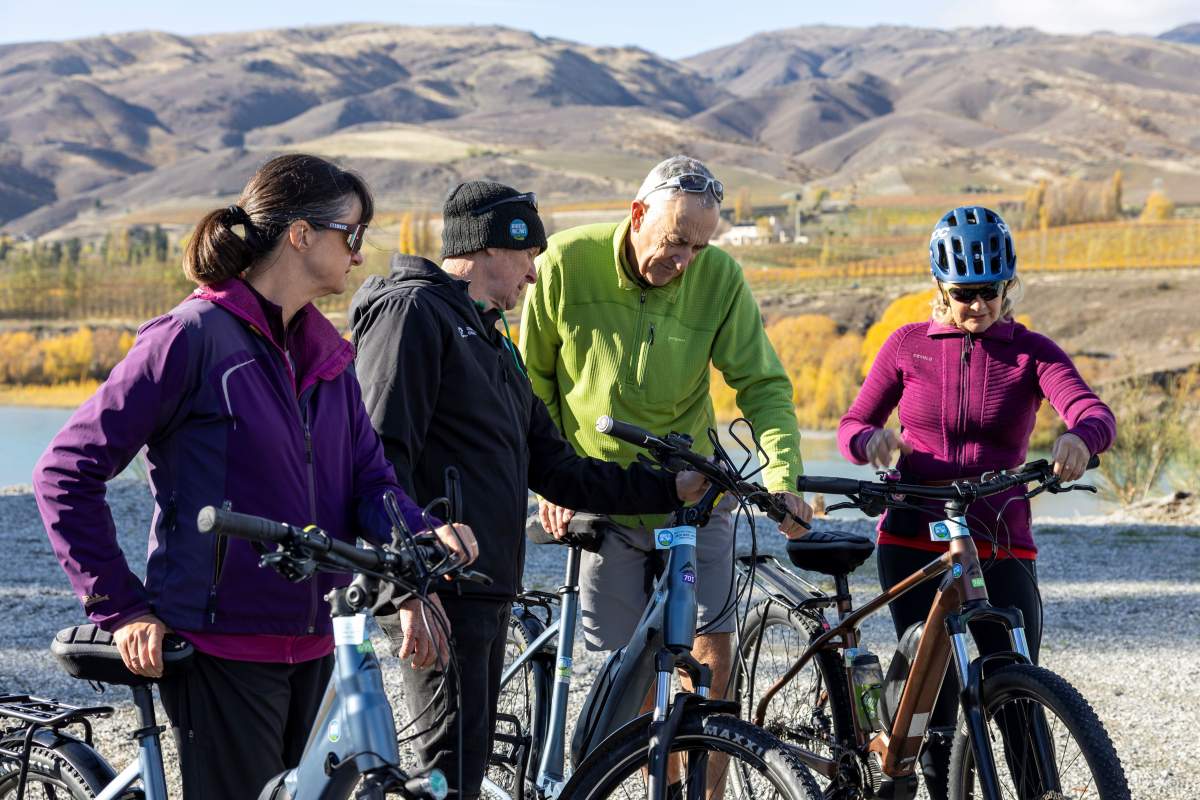
Your tour planner will help you choose the best bike for your route and budget.
Be flexible and book early
Gone are the days of bargains for last minute bookings, and you’re most likely to get a better deal if you can book early – even a year ahead! If you can be flexible with dates, there’s more chance that your tour operator will be able to work to your budget.
Avoid Peak Season
School holiday periods, of course, tend to be busy but autumn (March-April) is also a peak season along the Central Otago trails and prices can be at a premium during this time. Ideally plan your trip in the shoulder season. In the spring and early summer between October and Christmas or from late January to the end of February is a good time to visit Central Otago.
In Queenstown, summer is the height of the season and unlike Central Otago, autumn can be a good time to base yourself in or around Queenstown.
The trails are open year-round which means winter riding possible if you prepare properly. Find out more about winter trips here.
Travel light
The lighter you can travel the better. Less bags to transfer means budget saved.
Picnic-it-up
Whilst Otago is renowned for its exceptional food and wine, and you’d be remiss not to indulge at least once whilst on holiday, there are significant savings to be had if you prepare your own packed lunch and opt to picnic at a scenic spot along the trail and perhaps save that long lunch at the pub or winery as a special treat. There are lots of bakeries along the trails and pies are a well-known cycling superfood, allegedly....
If you do stop at a winery, buying a bottle of wine from the cellar door is generally a cheaper option than purchasing the same wine from the supermarket. Pop the bottle in your luggage so it’s transferred to your evening accommodation or utilise the panniers which are usually provided with rental bikes.
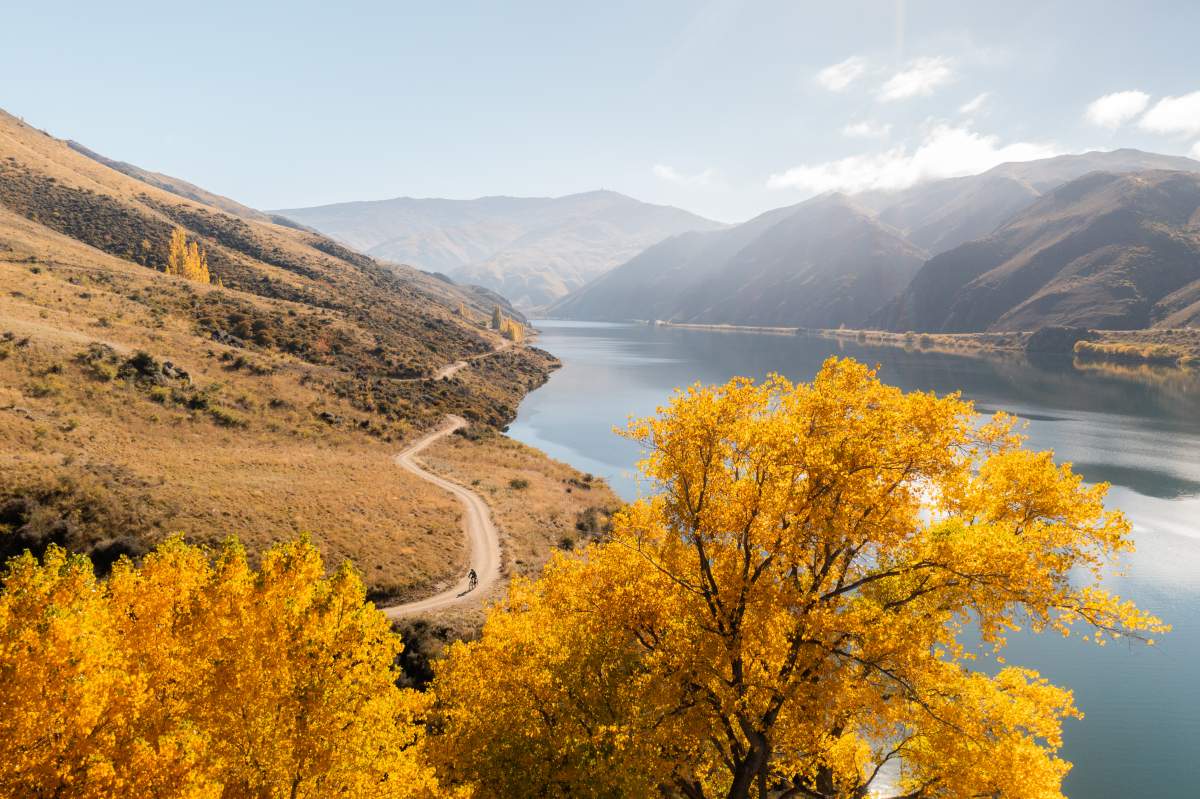
Autumn (March-April) offers perfect riding conditions - but is peak season in Central Otago. (Lake Dunstan Trail).
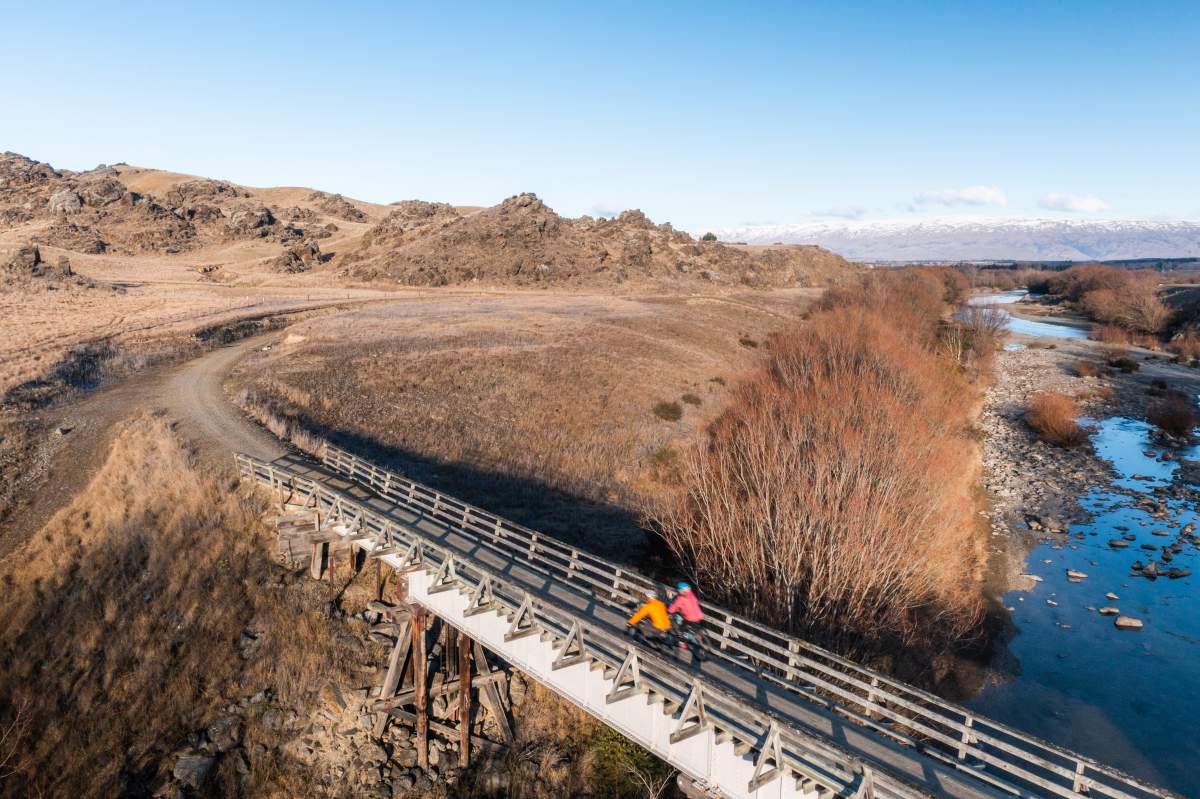
The trails are open year-round, including winter. (Otago Central Rail Trail).
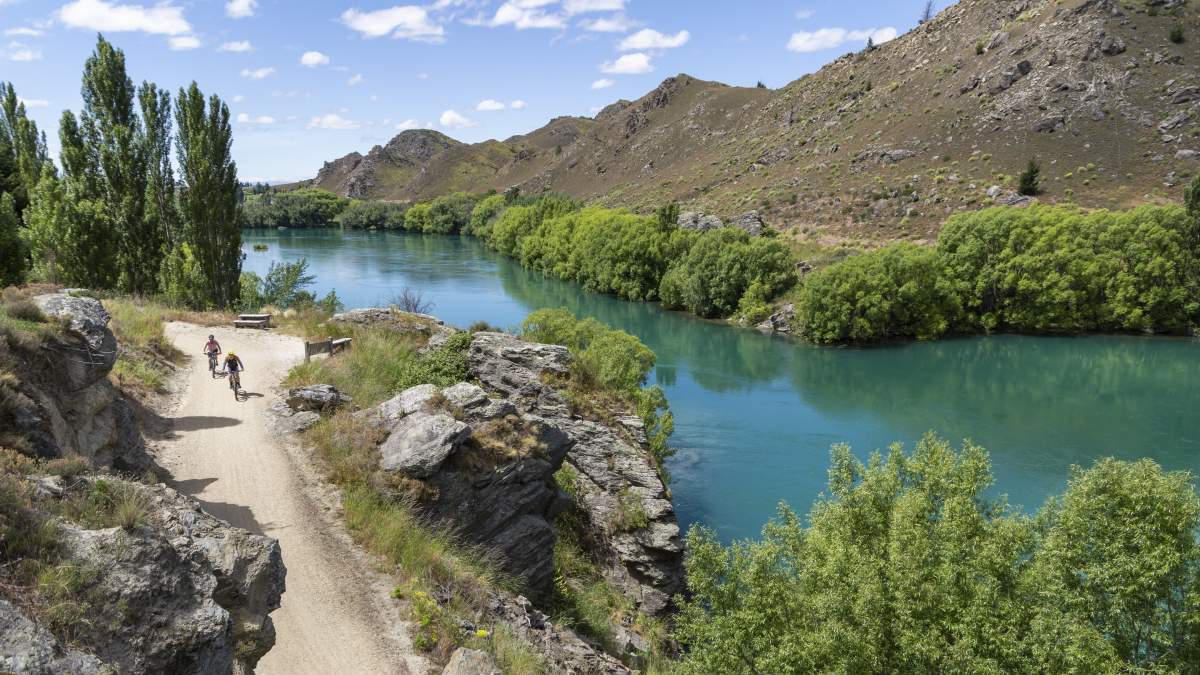
Spring and early summer is a good time to ride in Otago. (Roxburgh Gorge Trail).
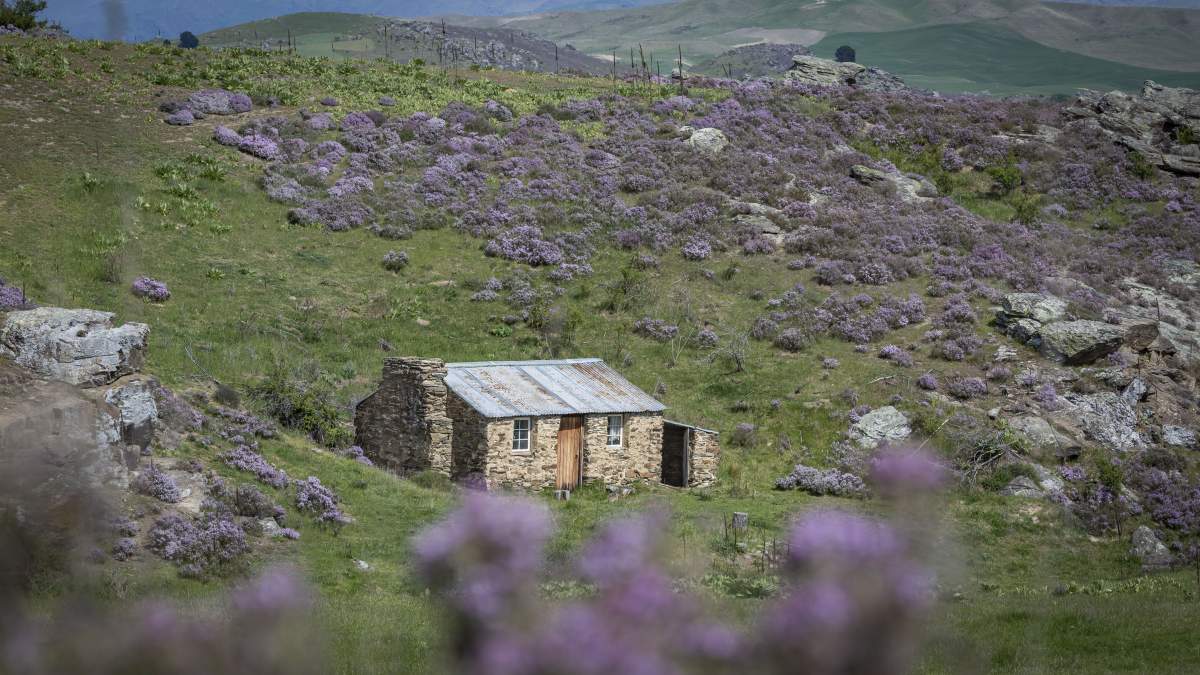
Wild thyme blankets the Otago hills in spring and early summer.
Bikepacking – the DIY approach
Bikepacking is a form of self-supported cycling that combines biking and backpacking, allowing riders to travel light and move efficiently over varied terrain and explore off-the-beaten track locations. Unlike traditional cycle touring, which typically involves riding on paved roads and carrying gear in panniers, bikepacking focuses on mountain biking or gravel riding with lighter, more compact gear strapped directly onto the bike. Riders often use frame bags, handlebar rolls, and seat packs to carry essential items like camping gear, food, and clothing.
Once you’re all set-up, bikepacking offers the freedom and independence for low-cost cycling adventures. However, getting kitted out with the right gear e.g. bike, camping gear etc. can be a costly exercise in the beginning.
Talk to the Locals
No one knows the area better than the people who live here. Talk to your accommodation hosts, hospitality staff or your tour operator and get advice from the local experts. They’ll be able to point you in the direction of local hidden gems which are off the beaten track.
Talk to other cyclists as well. In the summer, on the common cycling routes, you’ll be seeing other bikers every day. For those who are biking in the opposite direction to you, ask them about the road ahead….
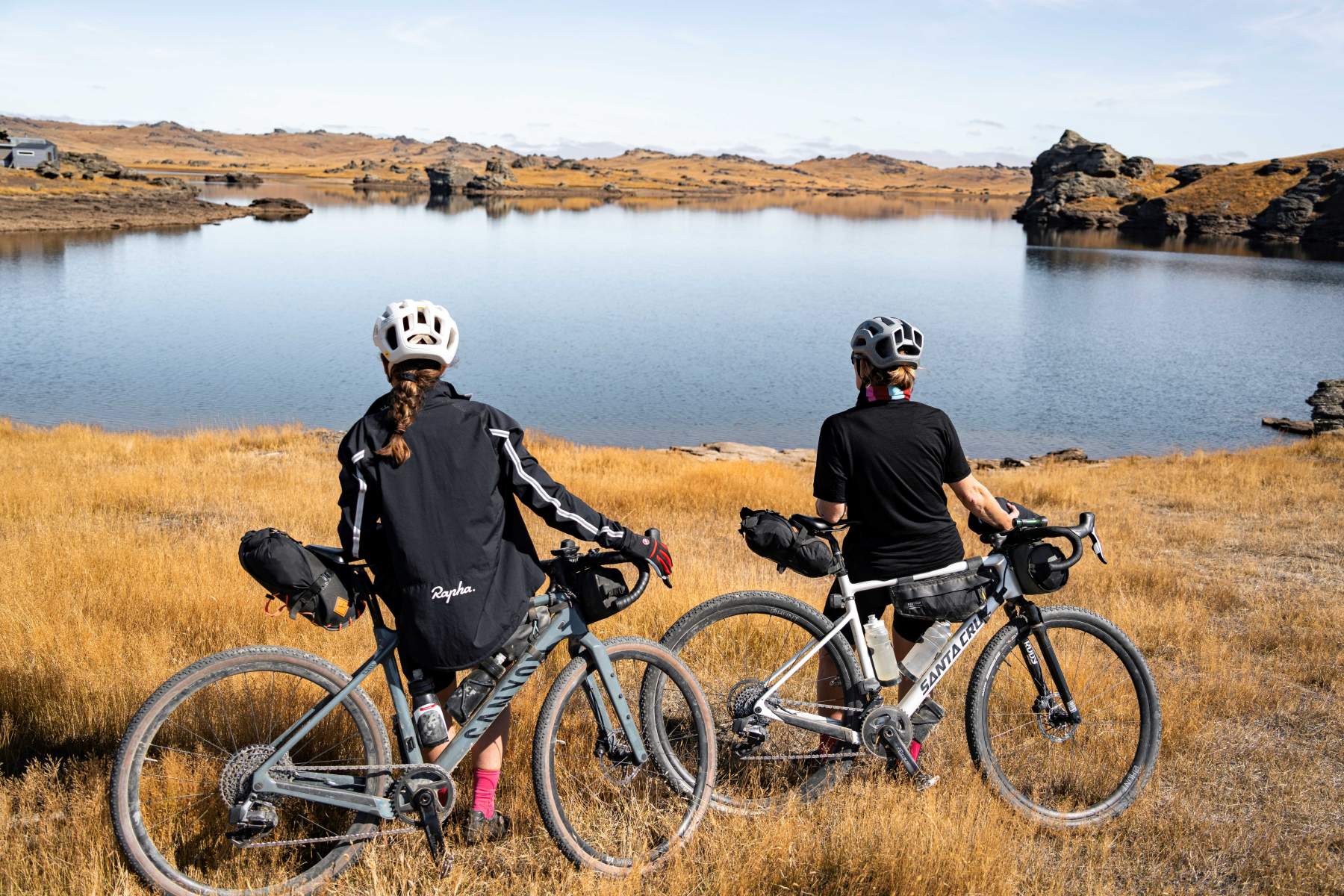
A bikepacking trip can be very cost effective, but initial setup is expensive. (Riley Mclay)

Related Stories
-

Reclaiming Wild
Two gutsy girls on an epic bikepacking mission to celebrate their 50th birthdays.
Read more about Reclaiming Wild -

-

In Pictures - The Shotover Gorge Trail
Images of the new Kimi-ākau | Shotover Gorge Trail in Queenstown
Read more about In Pictures - The Shotover Gorge Trail -

RIDE! Don't Drive
6 Reasons why riding a bike is the best way to explore Otago, New Zealand.
Read more about RIDE! Don't Drive -

Otago Central Rail Trail Pub Guide
A guide to the pubs along the Otago Central Rail Trail
Read more about Otago Central Rail Trail Pub Guide -

Best Bakeries in Otago
From cinnamon scrolls to cheese rolls - a guide to the best trailside bakeries in Otago.
Read more about Best Bakeries in Otago -

25 Years On Track
The old and the new - celebrating 25 years of the Otago Central Rail Trail
Read more about 25 Years On Track -

Neat Trail Places
An insider's guide to the neatest places along Central Otago's bike trails.
Read more about Neat Trail Places -

Clutha Gold Trail Beginners Guide
A beginners guide to the Clutha Gold Trail
Read more about Clutha Gold Trail Beginners Guide -

Beginners Guide to Queenstown Trails
A beginner's guide to biking the Queenstown Trails
Read more about Beginners Guide to Queenstown Trails -

Beginners Guide to the Otago Central Rail Trail
A beginner's guide to the Otago Central Rail Trail
Read more about Beginners Guide to the Otago Central Rail Trail -

Don't just ride - play bike!
If we play sports, then why don't we "play bike"?
Read more about Don't just ride - play bike!

